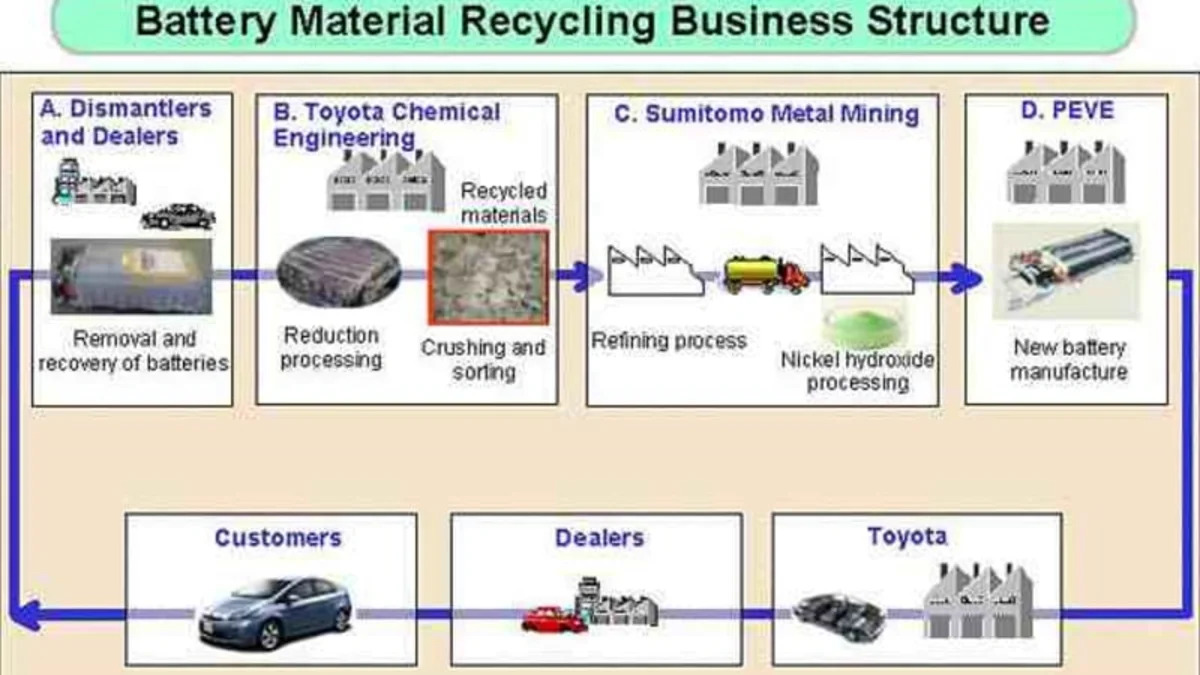What happens with spent nickel metal hydride (NiMH) batteries that can no longer power hybrid vehicles down the road? Well, until recently, most NiMH batteries recovered by car dealers or vehicle dismantling companies were shipped off for reduction treatment, a process which involves crushing and sorting materials found within the battery. The extracted nickel headed for stainless-steel production sites where it was used to make components like exhaust systems and everyday household items such as cookware.
Now, Toyota Motor Corporation, with assistance from Toyota Chemical Engineering Co., Ltd., Sumitomo Metal Mining Co., Ltd. and Primearth EV Energy Co., Ltd. will begin processing spent NiMH batteries and utilize the extracted nickel to make – are you ready for this? – new NiMH batteries. It seems so sensible to make new from old that we're almost in disbelief to learn that Toyota is the first company to do so with automotive NiMH batteries.
Battery-to-battery recycling, as it's called, requires highly precise sorting and extraction of nickel. The battery recovery and sorting process will be carried out by Toyota Motor and Toyota Chemical, nickel refining will be handled by Sumitomo Metal Mining and quality control checks will be covered by Primearth. For now, this battery-to-battery recycling program is limited to Japan, but Toyota is eying expanding it to other markets.
[Source: Toyota]
PRESS RELEASE
TMC, 3 Companies Start Joint Battery-to-battery Recycling
Tokyo, Japan, October 27, 2010-Toyota Motor Corporation (TMC), Toyota Chemical Engineering Co., Ltd. (Toyota Chemical Engineering), Sumitomo Metal Mining Co., Ltd. (Sumitomo Metal Mining) and Primearth EV Energy Co., Ltd. (PEVE) announce the launch of the world's first* business to recycle nickel in used hybrid-vehicle nickel-metal-hydride batteries for use in new nickel-metal-hydride batteries.
Previously, nickel-metal-hydride batteries recovered by car dealers and vehicle dismantling businesses were subjected to reduction treatment, and scrap containing nickel was recycled as a raw material for stainless-steel manufacturing. Now, with the development of high-precision nickel sorting and extraction technology, materials can be introduced directly into the nickel-refining process, thus achieving "battery-to-battery" recycling.
To carry out the business, TMC has established the Toyota HV Call Center to help recover the batteries, constructed advanced recycling facilities designed for mass production in cooperation with Toyota Chemical Engineering, and is receiving support from Sumitomo Metal Mining concerning the refining of nickel for use in batteries. TMC is also receiving support from PEVE concerning quality assurance in the manufacture of hybrid-vehicle nickel-metal-hydride batteries.
In addition, making use of trucks on return trips from parts deliveries is planned to reduce environmental impact, including CO2 emissions during transport.
The establishment of this recycling system in Japan will accelerate the creation of a sustainable, recycling-based society, a priority measure for TMC, and is a showcase for recovery and recycling technologies as effective means of promoting and reinforcing recycling in response to global resource limitations.
TMC is currently investigating introducing this recycling system overseas.
Battery Resource Recycling Flow
A: Recovery and transport
B: Reduction and sorting process (Toyota Chemical Engineering)
C: Nickel refining process (Sumitomo Metal Mining)
D: Battery manufacturing (PEVE)
Now, Toyota Motor Corporation, with assistance from Toyota Chemical Engineering Co., Ltd., Sumitomo Metal Mining Co., Ltd. and Primearth EV Energy Co., Ltd. will begin processing spent NiMH batteries and utilize the extracted nickel to make – are you ready for this? – new NiMH batteries. It seems so sensible to make new from old that we're almost in disbelief to learn that Toyota is the first company to do so with automotive NiMH batteries.
Battery-to-battery recycling, as it's called, requires highly precise sorting and extraction of nickel. The battery recovery and sorting process will be carried out by Toyota Motor and Toyota Chemical, nickel refining will be handled by Sumitomo Metal Mining and quality control checks will be covered by Primearth. For now, this battery-to-battery recycling program is limited to Japan, but Toyota is eying expanding it to other markets.
[Source: Toyota]
PRESS RELEASE
TMC, 3 Companies Start Joint Battery-to-battery Recycling
Tokyo, Japan, October 27, 2010-Toyota Motor Corporation (TMC), Toyota Chemical Engineering Co., Ltd. (Toyota Chemical Engineering), Sumitomo Metal Mining Co., Ltd. (Sumitomo Metal Mining) and Primearth EV Energy Co., Ltd. (PEVE) announce the launch of the world's first* business to recycle nickel in used hybrid-vehicle nickel-metal-hydride batteries for use in new nickel-metal-hydride batteries.
Previously, nickel-metal-hydride batteries recovered by car dealers and vehicle dismantling businesses were subjected to reduction treatment, and scrap containing nickel was recycled as a raw material for stainless-steel manufacturing. Now, with the development of high-precision nickel sorting and extraction technology, materials can be introduced directly into the nickel-refining process, thus achieving "battery-to-battery" recycling.
To carry out the business, TMC has established the Toyota HV Call Center to help recover the batteries, constructed advanced recycling facilities designed for mass production in cooperation with Toyota Chemical Engineering, and is receiving support from Sumitomo Metal Mining concerning the refining of nickel for use in batteries. TMC is also receiving support from PEVE concerning quality assurance in the manufacture of hybrid-vehicle nickel-metal-hydride batteries.
In addition, making use of trucks on return trips from parts deliveries is planned to reduce environmental impact, including CO2 emissions during transport.
The establishment of this recycling system in Japan will accelerate the creation of a sustainable, recycling-based society, a priority measure for TMC, and is a showcase for recovery and recycling technologies as effective means of promoting and reinforcing recycling in response to global resource limitations.
TMC is currently investigating introducing this recycling system overseas.
Battery Resource Recycling Flow
A: Recovery and transport
B: Reduction and sorting process (Toyota Chemical Engineering)
C: Nickel refining process (Sumitomo Metal Mining)
D: Battery manufacturing (PEVE)


Sign in to post
Please sign in to leave a comment.
Continue